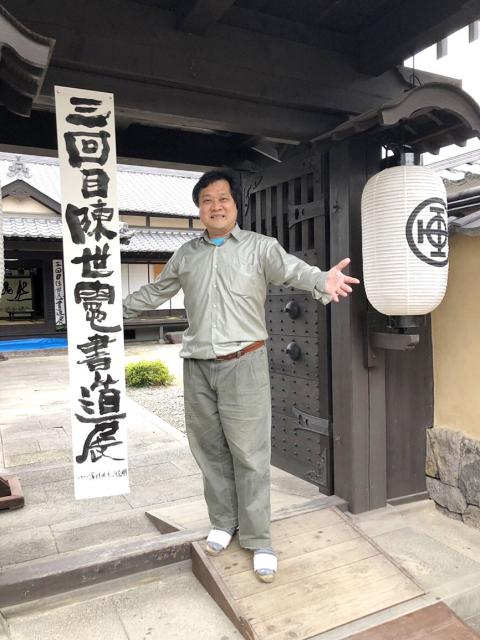Taiwanese calligrapher Chen Shih-hsien (陳世憲), who has long promoted cultural interaction with Japan, was on Friday last week invited to be a goodwill ambassador of Taketa City.
Chen said he first visited the city in Kyushu more than 20 years ago to visit a museum renovated from a samurai’s residence more than 400 years ago.
“At the time I thought to myself: ‘One day, I will hold an exhibition here,’” Chen said.

Photo courtesy of Chen Shih-hsien
He later met a retired teacher in Taketa and the two became fast friends, leading to the city becoming his “home away from home,” which he vowed to visit at least once every year, Chen said.
Taketa in the southwest corner of Oita Prefecture is home to Oka Castle, a remnant of Heian Period architecture. The castle was popularized by local songwriter Taki Rentaro’s Kojo no Suki (Moon Over the Ruined Castle).
In 2015, Chen finally fulfilled his wish and held a calligraphy exhibition at the museum.
The exhibition also featured his two books: Taketa and I (竹田因緣) and Traveling Word — Chen Shih-hsien’s Calligraphy Around the World (字遊─陳世憲的書法世界旅行).
Both books contain stories of his interactions with people in Taketa, Chen said, adding that he often goes to sing Kojo no Suki at karaoke when he misses his friends in Taketa.
The city said it began arranging visits to Kaohsiung’s Tienliao District (田寮) in 2015 and last year made official its cultural tourism ties with the district.
Chen held his third exhibition in Taketa during the Chikuraku Festival, which took place from Friday to Sunday, and wrote a haiku to commemorate a statue of a woman carved by Japanese sculptor Fumio Asakura.
The festival has been celebrated annually since 2000, when it was started as a way to maintain local bamboo groves and attract tourists.
Asakura mentored Taiwanese sculptors Huang Tu-shui (黃土水) and Pu Tien-sheng (蒲添生) when they were studying in Tokyo, Chen said.
Taketa Mayor Katsuji Shuto presented Chen with the goodwill ambassador honor, while Chen said he would invite a group of Taiwanese artists to attend a newly constructed performance hall in the city.

Chinese Nationalist Party (KMT) Chairman Eric Chu (朱立倫), spokeswoman Yang Chih-yu (楊智伃) and Legislator Hsieh Lung-chieh (謝龍介) would be summoned by police for questioning for leading an illegal assembly on Thursday evening last week, Minister of the Interior Liu Shyh-fang (劉世芳) said today. The three KMT officials led an assembly outside the Taipei City Prosecutors’ Office, a restricted area where public assembly is not allowed, protesting the questioning of several KMT staff and searches of KMT headquarters and offices in a recall petition forgery case. Chu, Yang and Hsieh are all suspected of contravening the Assembly and Parade Act (集會遊行法) by holding

PRAISE: Japanese visitor Takashi Kubota said the Taiwanese temple architecture images showcased in the AI Art Gallery were the most impressive displays he saw Taiwan does not have an official pavilion at the World Expo in Osaka, Japan, because of its diplomatic predicament, but the government-backed Tech World pavilion is drawing interest with its unique recreations of works by Taiwanese artists. The pavilion features an artificial intelligence (AI)-based art gallery showcasing works of famous Taiwanese artists from the Japanese colonial period using innovative technologies. Among its main simulated displays are Eastern gouache paintings by Chen Chin (陳進), Lin Yu-shan (林玉山) and Kuo Hsueh-hu (郭雪湖), who were the three young Taiwanese painters selected for the East Asian Painting exhibition in 1927. Gouache is a water-based

Taiwan would welcome the return of Honduras as a diplomatic ally if its next president decides to make such a move, Minister of Foreign Affairs Lin Chia-lung (林佳龍) said yesterday. “Of course, we would welcome Honduras if they want to restore diplomatic ties with Taiwan after their elections,” Lin said at a meeting of the legislature’s Foreign Affairs and National Defense Committee, when asked to comment on statements made by two of the three Honduran presidential candidates during the presidential campaign in the Central American country. Taiwan is paying close attention to the region as a whole in the wake of a

OFF-TARGET: More than 30,000 participants were expected to take part in the Games next month, but only 6,550 foreign and 19,400 Taiwanese athletes have registered Taipei city councilors yesterday blasted the organizers of next month’s World Masters Games over sudden timetable and venue changes, which they said have caused thousands of participants to back out of the international sporting event, among other organizational issues. They also cited visa delays and political interference by China as reasons many foreign athletes are requesting refunds for the event, to be held from May 17 to 30. Jointly organized by the Taipei and New Taipei City governments, the games have been rocked by numerous controversies since preparations began in 2020. Taipei City Councilor Lin Yen-feng (林延鳳) said yesterday that new measures by